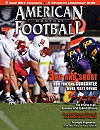Article CategoriesAFM Magazine
|
Coach to Coach – Coaching to Make a Differenceby: Bryon HamiltonHead Coach, Foothill High School, Palo Cedro (CA) © More from this issue The longer I coach and the more time I spend witnessing kids transform into young men, the more I realize that in this profession we have the opportunity and the responsibility to be more than just a coach. Coaching allows all of us the unique opportunity to leave a lasting imprint on the lives of our players. Our profession is one of only a few that will mold and shape future business leaders, politicians, husbands, fathers, clergy, infantry and military leaders. One of my favorite maxims comes from the book of Luke. It states “To whom much is given, much is required”. The privilege of coaching comes with enormous responsibility. That may sound pretty “lofty”, but it is true. After a tough loss or a meeting with a “concerned” parent it may not feel like it, but we are fortunate to be entrusted with the formative years of o....The full article can only be seen by subscribers.
|
|
|||||||
| HOME |
MAGAZINE |
SUBSCRIBE | ONLINE COLUMNISTS | COACHING VIDEOS |
Copyright 2026, AmericanFootballMonthly.com
All Rights Reserved





